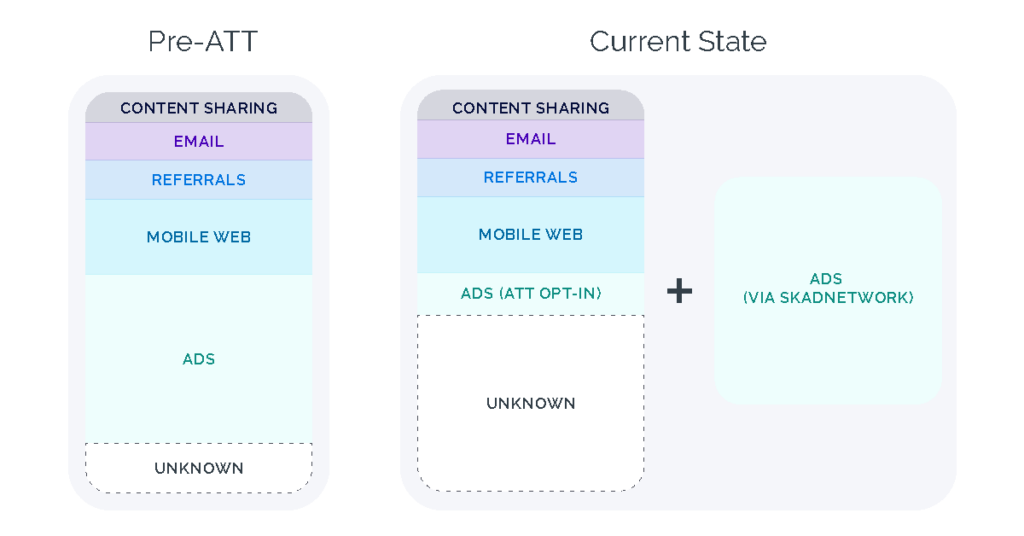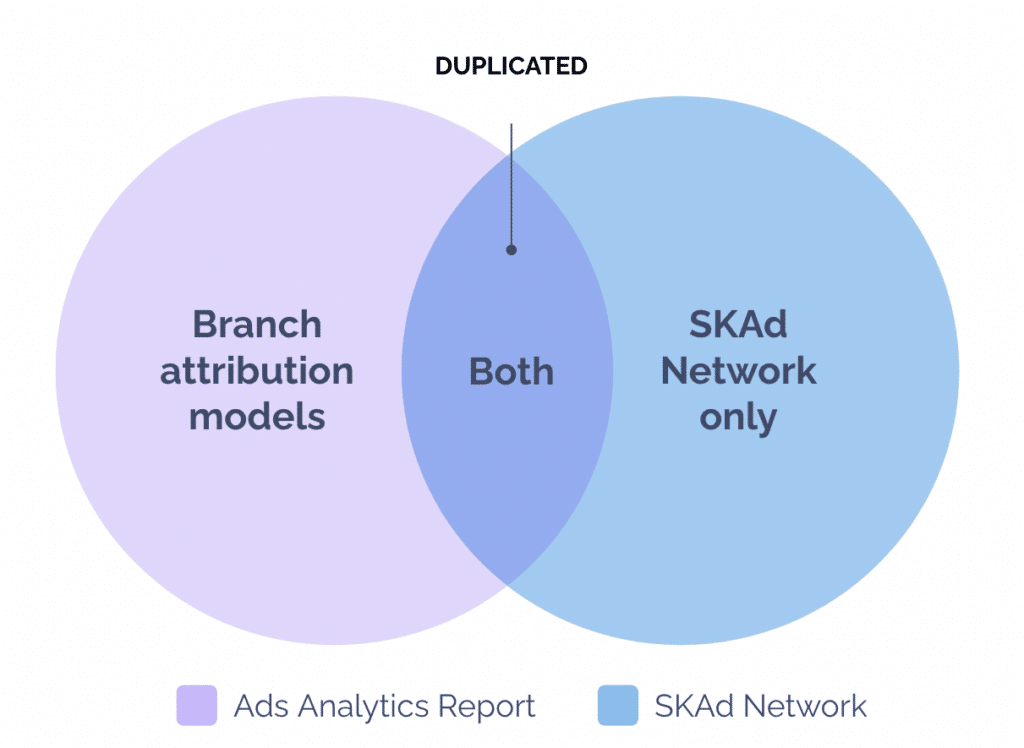Department is thrilled to share our newest launch: Unified Analytics!
With the existence of a number of variations of SKAN comes the problem of understanding the attribution information it generates alongside each different attribution supply. Enter Unified Analytics from Department: now, it’s simpler than ever earlier than to see your information multi function place with out having to cobble collectively info from a number of sources.
And also you don’t have to fret about deduplicating your information, both — we’ll care for that for you.
TL;DR:
With Unified Analytics, now you can:
- Analyze SKAN and non-SKAN cross-platform attribution information inside a single unified analytics view.
- Precisely calculate metrics (corresponding to eCPI, eCPA, ROI, ROAS, and many others.) based mostly on a corrected, deduplicated conversion rely!
- Break up your complete deduplicated conversion counts into SKAN and non-SKAN by way of an easy-to-control toggle
- View the deduplicated information on installs and occasions on this report by default.
- Perceive your true natural baseline.
As well as, the Department platform has been up to date to help your transition to SKAN 4.0.
This help contains updates to the Department SDKs and SKAN Analytics view, alongside SKAN configuration instruments. Test it out right here!
Let’s focus on the precise issues advertising groups are fighting at present that SKAN Unified View uniquely solves for.
Why do you want Unified Analytics?
For just a few causes — however primarily as a result of SKAN reporting modifications the paradigm of how most entrepreneurs at present have a look at their information. That is what iOS attribution information seems to be like now:

Understanding iOS attribution information has turn out to be advanced, and deduplicating this information manually is difficult.
To make knowledgeable selections about how they allocate their spend, entrepreneurs that leverage this information require a single supply of fact that precisely attributes occasions and income.
Attribution Pre-iOS 14:
MMPs attributed all iOS customers again to paid campaigns utilizing device-level attribution methodologies.
After all, for customers who opted in, deterministic attribution leveraging the IDFA was attainable. However for customers who opted out, MMPs might gracefully fall again to probabilistic attribution. Any complexity in attribution was dealt with behind the scenes, however for entrepreneurs, the efficiency information was seamlessly out there in a single single dashboard which included clear calculated metrics like eCPI, eCPA, ROAS and many others.
Attribution iOS 14 onward:
With the introduction of ATT (App Monitoring Transparency Framework) and SKAd Community (Apple’s combination degree attribution methodology) in iOS 14, Department and different MMPs began attributing iOS customers again to paid campaigns utilizing information from a number of information streams and disparate attribution methodologies.
Complexities (i.e. opted-in customers vs opted-out customers, device-level attribution vs. aggregate-level attribution by way of SKAd Community and many others.) have been launched in the best way entrepreneurs appeared on the efficiency of paid advertisements.
For entrepreneurs, this meant that information for a similar paid marketing campaign was now out there in two completely different studies/dashboards with completely different ranges of granularity. Additional, the absence of IDFA meant that it was tough to tie the info collectively with out together with duplicate information.
So why can’t entrepreneurs merely add up numbers from the 2 studies?

These modifications made it tough for entrepreneurs to have a holistic view of marketing campaign efficiency. Referring to a number of dashboards grew to become a trouble, deduplication throughout attribution methodologies grew to become tougher, and misinterpretation of marketing campaign outcomes turned more and more possible!
Getting correct reporting on marketing campaign metrics (like eCPI, eCPA, ROAS) and having a transparent image of the natural baseline — issues that have been taken as a right in a pre-ATT world — have been now an uphill activity for efficiency entrepreneurs.
Consequently, the challenges entrepreneurs have needed to face up till at present have been plentiful:
- Entrepreneurs wanted to collate information from a number of dashboards. Consequently, they both report inaccurate efficiency numbers (by merely including up conversion counts throughout studies) or battle to use customized deduplication logic on their finish. Entrepreneurs additionally should manually right when customers are attributed as natural as an alternative of non-organic media and that information as a rule lives on a separate dashboard.
- Parallel attribution by means of SKAN for opted-in customers led to duplicate conversions. In different phrases, due to opt-in, there’s no dependable method to know if a person attributed in SKAN is exhibiting up twice — a less-than-ideal situation to be in.
- There was no simple method to view Android, iOS, and net information side-by-side, making it tough to have a holistic view of marketing campaign efficiency. There was additionally no correct method to view key metrics (corresponding to eCPI, eCPA, and many others.) in a single place, making it extraordinarily tough to optimize based mostly on partial or incomplete information.
Lengthy story quick: with out a central, unified supply of fact, entrepreneurs will battle with the very excessive potential for handbook errors and misrepresentation of marketing campaign outcomes.

What issues does Unified Analytics deal with — and the way?
With this highly effective instrument, you may measure marketing campaign information from all attribution strategies (together with SKAN) merged in a single view.
The Unified Analytics dashboard presents correct efficiency information, as overlapping units of customers attributed by way of each SKAN and conventional MMP methodologies are deduplicated.

This implies now you can precisely calculate metrics (corresponding to eCPI, eCPA, ROI, ROAS, and many others.) based mostly on a corrected, deduplicated conversion rely!
Not do you’ll want to collate information from a number of dashboards, nor battle to use customized deduplication logic in your finish. You’ll additionally now have the ability to analyze SKAN and non-SKAN cross-platform attribution information inside a single unified analytics view.

Moreover, now you can break up your complete deduplicated conversion counts into SKAN and non-SKAN by way of an easy-to-control toggle.

This ensures that natural counts inside Unified Analytics are corrected/scaled down appropriately and helps you perceive your true natural baseline.
Consequently, you’ll have the ability to view the deduplicated information on installs and occasions on this report by default.

Department has additionally constructed the mandatory parts to help transitioning to SKAN 4.0. These modifications — together with updates to our SDKs, our dashboard SKAN configuration instruments, and an enhanced SKAN Analytics view inside our dashboard — enable for a deeper understanding of alerts out of your iOS customers.
When ought to I take advantage of Unified Analytics?
Department’s Unified Analytics is now out there inside the Advertisements subsection of the Department Dashboard to all Advertisements Attribution clients and helps all kinds of use instances together with (however not restricted to):
- Advertising and marketing spend allocation: By having holistic and correct efficiency reporting for iOS customers, you can also make faster data-driven selections on which channels to double down on, and higher allocate budgets over time.
- Marketing campaign reporting & optimization: Now you can report on marketing campaign efficiency and optimize campaigns on a day-to-day foundation extra successfully.
- Deduplication standardization: Makes it pointless so that you can apply any customized deduplication logic in your finish — and minimizes errors of double counting or over-reporting.
Inner alignment throughout stakeholders: Marketing campaign efficiency numbers that your complete advertising group can agree on.
What’s subsequent?
Now it’s simpler than ever earlier than to see all your attribution information in a single place. That being stated — whereas Unified Analytics helps all variations of SKAN, the cell ecosystem nonetheless has some catching as much as do to completely help SKAN 4.0.
In navigating the paradox, Department may help you keep enterprise continuity. That means, you may proceed working your SKAN campaigns and conversion reporting as you often would.
Whereas SKAN is continuous to vary and develop as we converse, you may keep up-to-date on modifications by testing our newest weblog posts:






